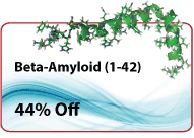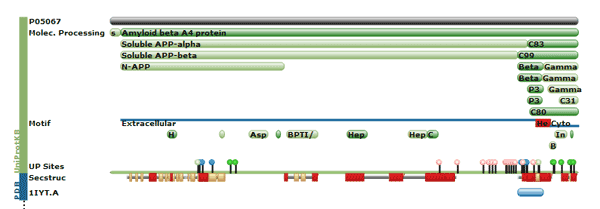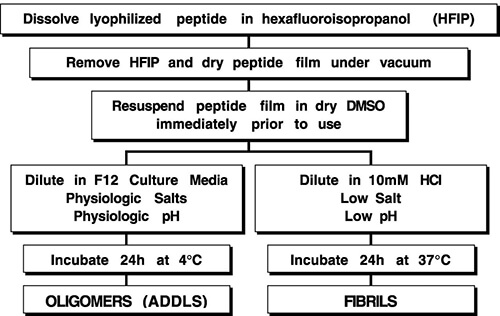
 Reference:
Reference: Role of the beta-amyloid protein in Alzheimer's disease.
How to form the fibrillary structure using beta-amyloid peptides?

Amyloid (1-42) was dissolved to 1 mM in 100% hexafluoroisopropanol, hexafluoroisopropanol was removed under vacuum, and the peptide was stored at -20 C. For the aggregation protocols, the peptide was first resuspended in dry Me2SO (DMSO) to 5 mM. For oligomeric conditions, F-12 (without phenol red) culture media was added to bring the peptide to a final concentration of 100 uM, and the peptide was incubated at 4 C for 24 h. For fibrillar conditions, 10 mM HCl was added to bring the peptide to a final concentration of 100 uM, and the peptide was incubated for 24 h at 37 C. ADDLS, amyloid-derived diffusible ligands.
Peptide science is expanding rapidly due to the potential applications of these biocompatible and bioactive molecules. However, their use in medicine is limited by several factors, with low solubility being a significant hurdle in early drug development. Solubility is crucial but not well understood, and no universal method exists for peptide solubilization. This review examines the challenges in dissolving peptides and the factors influencing their aggregation and evaluates various solubilization strategies. Here are some practical tips for handling difficult sequences, with a focus on challenging amyloids like amyloid beta (Aβ), insulin, and phenol-soluble modulins (PSMs). Download the reference Here.
Reference:
Polanska O, Szulc N, Stottko R, Olek M, Nadwodna J, Gasior-Giogowska M, Szefczyk M. Challenges in Peptide Solubilization - Amyloids Case Study. Chem Rec. 2024 Jul 18:e202400053. doi: 10.1002/tcr.202400053. Epub ahead of print. PMID: 39023378.
Oligomeric and Fibrillar Species of Amyloid-Peptides Differentially Affect Neuronal Viability; https://www.jbc.org/article/S0021-9258(20)70063-3/pdf
| Beta-Amyloid (1-42), human |
| 0.5 mg, 1 mg, 5 mg |
| Beta-Amyloid (Aβ or Abeta) is a peptide of 36-43 amino acids that is processed from the Amyloid precursor protein. Beta-amyloid protein is a 39-43 amino acid peptide composed of a portion of the transmembrane domain and the extracellular domain of the amyloid precursor protein (APP). APP occurs as several A beta-containing isoforms of 695, 751, and 770 amino acids, with the latter two APP containing a domain that shares structural and functional homologies with Kunitz serine protease inhibitors. Beta-amyloid plays a central role in information processing in the brain. A certain quantity of the protein is necessary for the transmission of information to neurons. A major histopathological hallmark of Alzheimer's disease (AD) is the presence of amyloid deposits in the parenchyma of the amygdala, hippocampus, and neocortex. Aβ40 and Aβ42 are considered neurotoxic, both as deposits in the brain and blood vessels of Alzheimer's disease and Down's syndrome to find patients. It is therefore assumed that the prevention of the senile plaques known as deposits would improve the symptoms of these diseases. |
| LT2460 (Batch# 052487) |
| >95% |
| 4514.14 |
| C203H311N55O60S1 |
| Asp-Ala-Glu-Phe-Arg-His-Asp-Ser-Gly-Tyr-Glu-Val-His-His-Gln-Lys-Leu-Val-Phe-Phe-Ala-Glu-Asp-Val-Gly-Ser-Asn-Lys-Gly-Ala-Ile-Ile-Gly-Leu-Met-Val-Gly-Gly-Val-Val-Ile-Ala, DAEFRHDSGYEVHHQKLVFFAEDVGSNKGAIIGLMVGGVVIA |
 https://www.lifetein.com
100 Randolph Road, Suite 2D,
Somerset
USA
New Jersey
08873
https://www.lifetein.com
100 Randolph Road, Suite 2D,
Somerset
USA
New Jersey
08873
 https://www.lifetein.com
100 Randolph Road, Suite 2D,
Somerset
USA
New Jersey
08873
https://www.lifetein.com
100 Randolph Road, Suite 2D,
Somerset
USA
New Jersey
08873